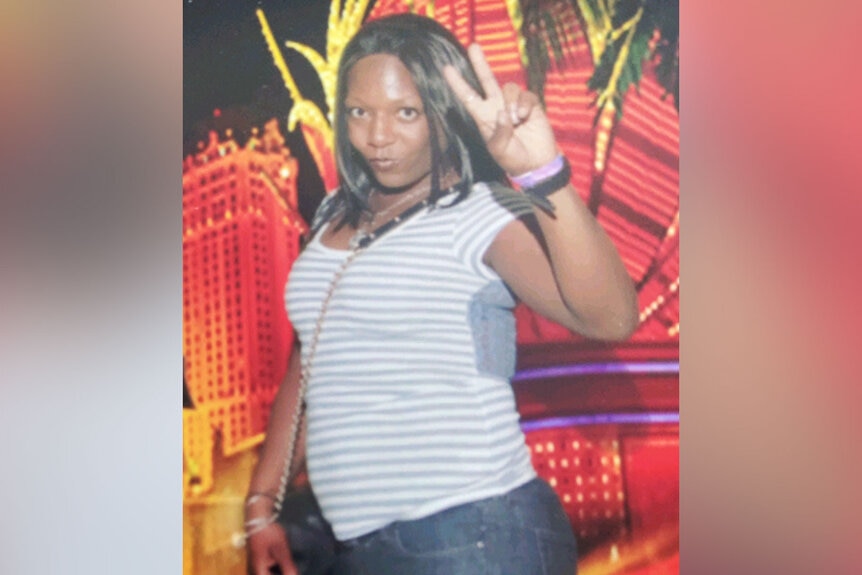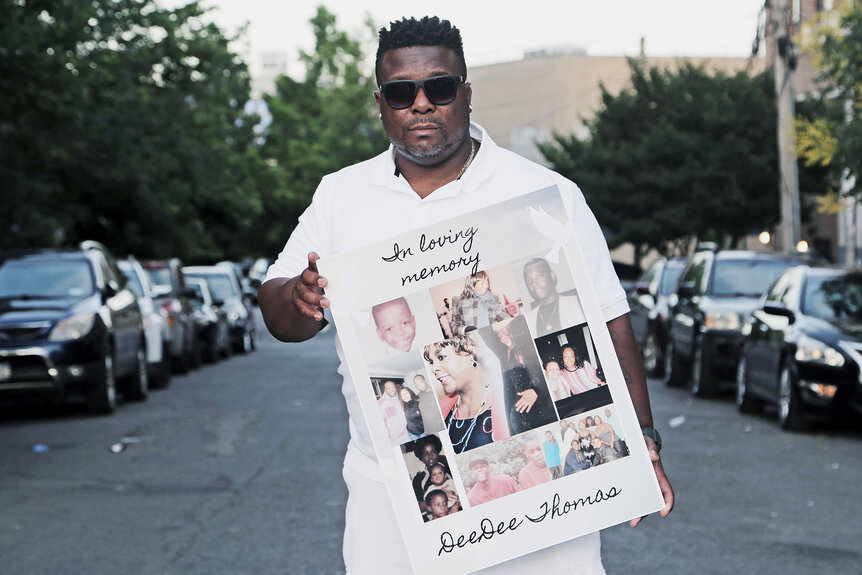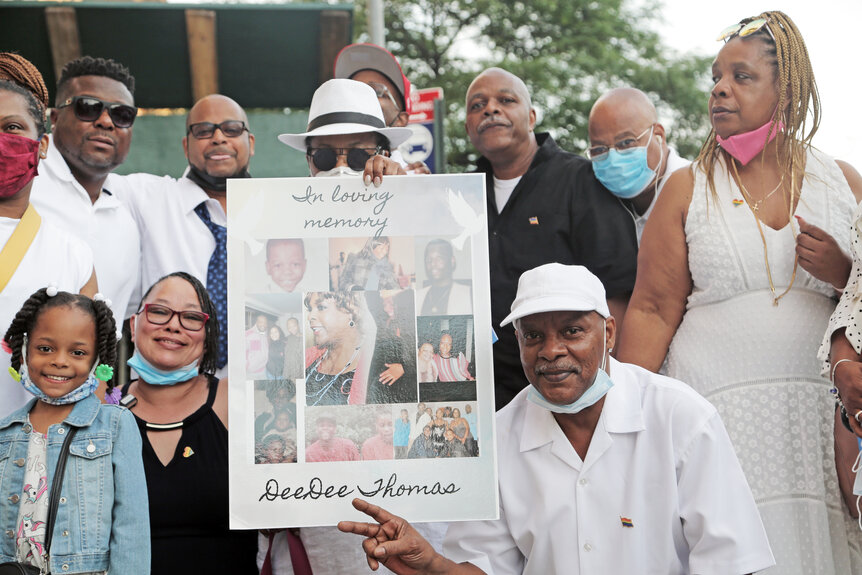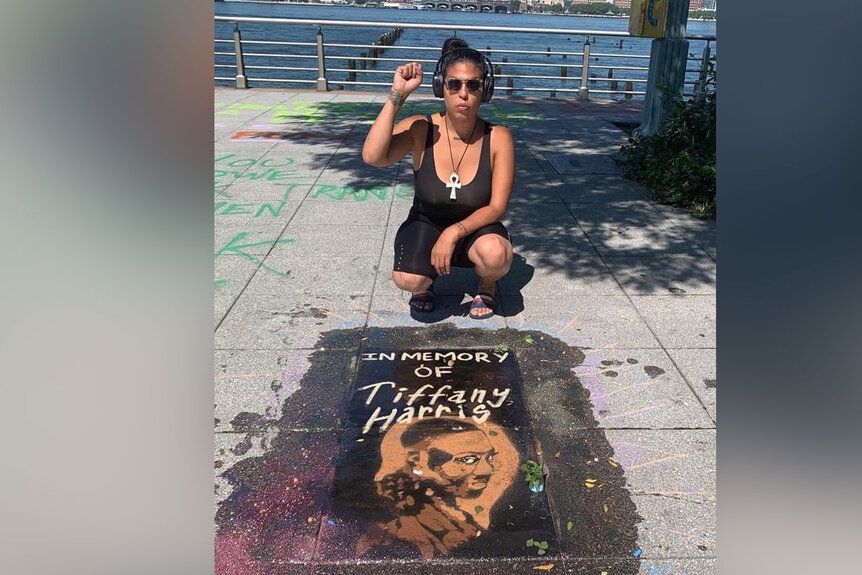Create a free profile to get unlimited access to exclusive videos, breaking news, sweepstakes, and more!
‘This Is A Mystery:’ Family Of Black Trans Woman Whose Body Was Found In Trash In NYC Seek Answers
DeeDee Thomas, 42, was a “sweet soul” and a commanding storyteller with the "gift of gab," her family said.
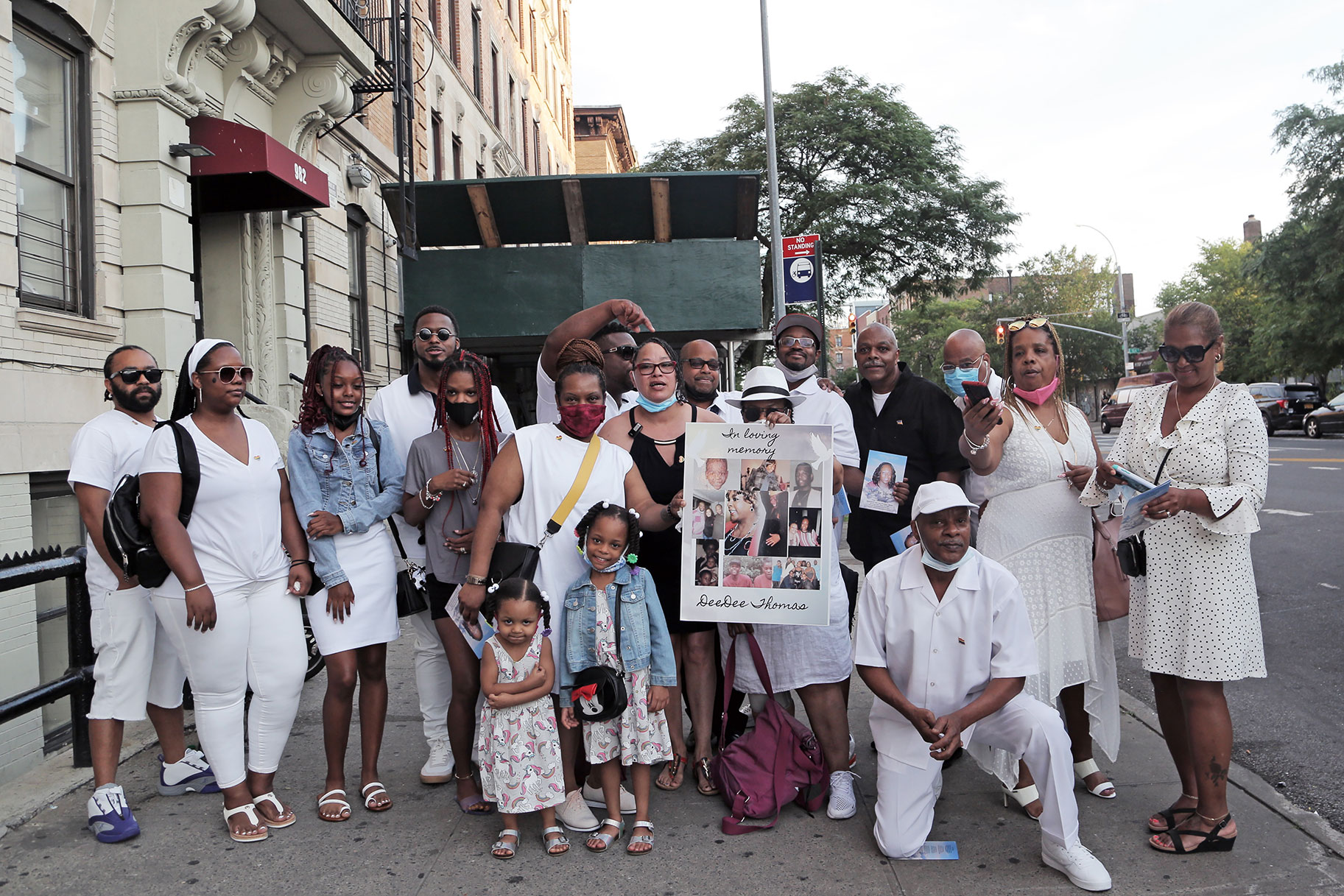
The family of a transgender woman whose body was found in a dumpster in New York City is demanding answers nearly a month after the gruesome discovery.
On June 6, DeeDee Thomas’ remains were found in a garbage can on FDR Drive between 112th and 114th Street in Harlem. She was 42.
Foul play is suspected, however her death hasn’t yet been ruled a homicide. It’s also unclear how she may have died. An autopsy is pending.
A can collector scouring a dumpster for recyclables initially found Thomas after noticing a "funny smell," detectives told her family.
"He looked inside the garbage and there she was," David Rucker, Thomas' brother, told Oxygen.com.
Rucker, a part-time DJ and warehouse agent at John F. Kennedy International Airport, was at work when he learned his sister's body had been recovered. He's now anxiously awaiting any news from police.
“This is a mystery,” Rucker, 47, said. “I don’t know how she wound up in there like that. And who would do something like that? She can’t do that by herself. I need answers but they not giving me no answers.”
Thomas' brother criticized investigators for being non-communicative since opening the case.
“They haven’t called me yet, they haven’t told me anything,” he added.
On June 25, roughly two dozen of Thomas’ family members gathered at a small funeral parlor in the Bronx for a memorial service.
“I want to know if anybody can tell us what happened,” Janice Brazier, Thomas’ aunt, told Oxygen.com. “Or if someone can get a toxicology report. We’re waiting on all that. We haven’t heard anything. It’s a lot of stuff that we don’t know.”
Thomas’ family described her as a “happy,” “beautiful,” and “sweet soul” who “loved all her family deeply.” Most of all, Thomas was a bombastic storyteller, loved ones said.
"You could hear her talk all day," Rucker said. "She got the gift of gab, you just don't know."
Thomas grew up in the Bronx’s Forest Houses projects.
“She liked to dance, she liked to sing, and she loved to do hair, too, and make up,” Brazier added. “She loved all that.”
Thomas, who was designated male at birth, transitioned in her 20s, her family said.
“From a child, she knew who she was,” Brazier added. “She was always curious, asked a lot of questions. Wanted to know everything.”
Thomas endured “many struggles,” in her short life, family said. As an adult, she battled drug addiction, cycled in and out of New York City’s shelter system, and was arrested dozens of times. She also lived with HIV.
Prior to her death, the 42-year-old lived between her mother's home in the Bronx and Barbour Hotel, a lower Manhattan shelter, staff there confirmed.
“She had issues that she was trying to iron out,” Rucker said.
In January, Thomas’ 63-year-old mother, Karen Duncan, who was chronically ill, died.
“It crushed her,” Rucker said. “She was trying to be strong with it in front of me. But deep inside she was trying to get herself together.”
Thomas was “very close” with her mother, her aunt said.
“She went through a whole lot,” Brazier explained. “She was missing her a lot.”
Family members said they last saw Thomas cleaning out her mother’s house in recent months.
"When I last saw her she was fine," Brazier said. "She was in a good mood."
Other relatives suspect Thomas may have also been the victim of domestic violence.
"When my mother was alive, I'd go visit and she'd be there — and she doesn't look right," Rucker said. "She looked like she'd been in a fight. Then the next thing you know, she'd say she fell down the steps, something like that. I guess whoever she was around was abusing her. We never knew the person that was around her."
The District Attorney's Office wouldn't specifically confirm that Thomas’ death is being investigated as a hate crime, but did direct anyone with information on the case to contact the office's hate crimes hotline. Her body was so badly decomposed, however, that investigators weren’t immediately able to determine a cause and manner of death. Homicide detectives assigned to the case are now awaiting forensic pathology results.
“The Manhattan D.A.’s Office is fully committed to protecting the lives of transgender women of color, who are far too often the victims of violent crime,” a spokesperson for the Manhattan District Attorney’s Office said in a prepared statement.
Detectives are also speaking with members of New York’s trans community and others who may have had recent contact with her. The case is “active and ongoing,” officials said.
“We are working on it,” Katie Doran, special advisor to the Manhattan District Attorney on Lesbian, Gay, Bisexual, and Transgender Issues, told Oxygen.com.
Thomas’ possible murder comes at a time of increased violence against the transgender community. In 2020, a record 44 deaths were nationally tracked by Human Rights Campaign, America’s largest LGBTQ advocacy group. So far this, year, at least 29 transgender or non-conforming individuals have been murdered. The majority were Black and Latino transgender women.
New York City, in particular, has seen a sharp jump in such crimes. Police recorded at least 25 suspected sexual orientation hate crimes this year — compared to only nine at this time last year, according to city data.
“It’s unfortunate that right now during Pride that we’re here at a memorial for DeeDee,” Jevon Martin, the founder and executive director of Princess Janae Place, a nonprofit working with New York’s Black transgender community, told Oxygen.com. “We should be celebrating who we are but yet we’re celebrating the life of someone that we lost.”
New York’s LGBTQ+ community has since rallied around Thomas and her family, joining a growing chorus of activists calling for justice in the aftermath of her death.
Martin, 35, who is a Black transgender man, himself, attended Thomas’ memorial last week.
“It’s horrible, it’s scary,” Martin, 51, added. "It makes me angry. Why are people not angry about this? This is not right, it’s not okay. More people need to be here, more people need to be screaming and yelling, ‘Stop killing us.’ No one deserves this.”
As Thomas' family slowly dispersed from in front of the Bronx funeral home Friday evening, the city’s LGBTQ+ community was gearing up for weekend of events to commemorate NYC Pride.
“[DeeDee] is notable for dying in Pride month and nobody is talking about it,” Mariah Lopez, executive director of STARR, America’s oldest transgender rights organization, told Oxygen.com.
The 36-year-old trans activist knew Thomas personally. She explained that the area where Thomas’ body was found is “very dangerous.” She, too, is restlessly waiting on autopsy results.
“They didn’t need to dispose of her like trash,” Lopez added. “She did not get there by accident. She was either murdered or she got there because we failed her. You don’t ignore a person who died and whose body is disposed of in the street."
Unsheltered transgender individuals living on the street, too, face increased risks, as well as barriers, in securing adequate housing in comparison to their cis-gender counterparts. In the U.S., 1 in 5 transgender people have been discriminated against while seeking a home, according to the National Center For Transgender Equality. Many have been evicted — or pushed out by their families — due to their gender identity.
“There are dozens, dozens, hundreds maybe, of trans people that have entirely fell off the grid or forgotten because they were older, or homeless, or mentally ill trans people, or suffering from substance abuse or being rejected by their families,” Lopez said.
A significant percentage of trans people who find themselves living without a roof over their head suffer from underlying physical and mental health conditions, Lopez explained. A Black trans person experiencing homelessness, especially, is twice as likely to be attacked than a white person living on the streets.
"We know that there is a high level of HIV-prevalance amongst transgender women of color, mostly by circumstance," Lopez said. “These people’s lives go unnoticed. They go unmattered. And that’s not okay. It’s important right now that we look at it.”
Lopez called on city and state officials to reform New York's shelter system to allow for “low-barrier,” “round the clock,” and “high quality” accessible shelter options that's inclusive to the entire transgender community, regardless of age, race, or immigration status.
"We need top to bottom reform in the shelter system," Lopez said. "The primary tool of harm reduction is meeting people where they're at. DeeDee should be able to have walked in. ... She needed to come into a place where there were people that looked like her or were ready to receive someone like her and made her feel like a human."
Anyone with information related to Thomas’ death is urged to contact the New York City Police Department’s Crime Stopper tip line at 1-800-577-8477 or by calling the Manhattan District Attorney’s Office Hate Crimes Hotline at 212-335-3100.
